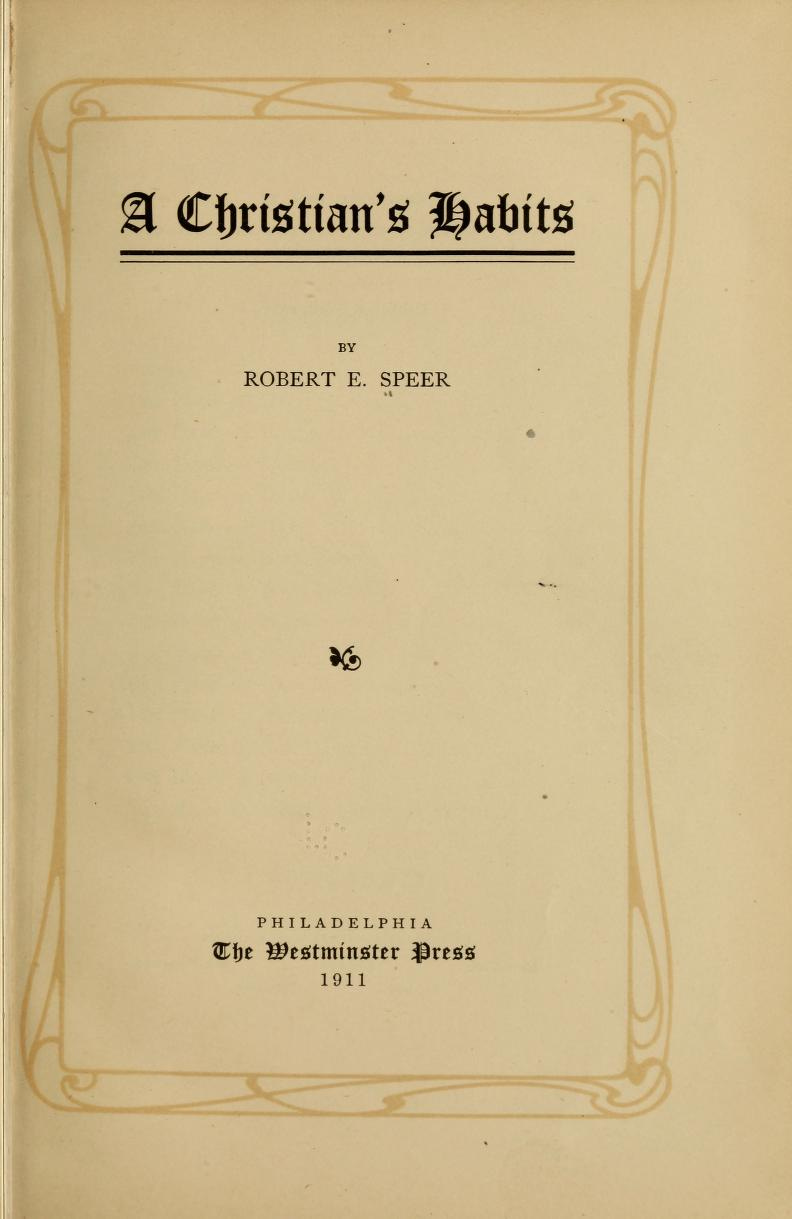“I am planning a two-session small group gathering later this year to discuss, very practically, how we can build Speer’s habits more deeply into our everyday lives.”
Why focus 15 posts on “habits”?
Because “What” depends on “when,” “where” and “who.”
He was a 50-something white man; bald, not muscular but definitely skinny. I could tell because he shuffled past me in his birthday suit, except for his white ankle-length socks and tennis shoes. It was a surprising sight, but it wasn’t shocking. You see, the “when,” “where,” and “who” explained the “what.”
The “where” was the men’s locker room in the downtown Los Angeles YMCA. I’m a member there. The “who” was another member of the YMCA and the “when”, well, let me tell you the “when” as my story continues.
As soon as I saw him I decided I had to have some fun. I walked past him, and, without stopping, I turned my head and said, “You know you don’t have any clothes on, don’t you?” He gave me a knowing smile and a half laugh, not a bad response for my lame attempt at humor. Then he began to explain. He told me that after his workout he realized that he had forgotten to bring a towel. But he needed a shower and took one anyway. Somehow, in his mind, that explained his actions. I’m not sure his explanation really made sense to me, but it was enough of a “what” to secure the whole scene a place in my “quirky stories to share in a special event like a Substack post” mental file.
And here’s how it connects with “habits.”
When we decide to follow Jesus, that action, that “what” needs to come into alignment with our “when,” “where,” and “who” if it is going to make any sense to us or to those around us. When we call ourselves followers of Jesus, but don’t follow that up with the “when,” “where,” and “who,” of our change of life, we end up looking as silly as my YMCA friend if he showed up in that exact same state in a public library, or in the middle of the street or even in a church sanctuary. Our commitment wouldn’t be intelligible to anyone. It would just be weird and worthy of a 911 call. And we wonder why Christians have such a bad reputation. So when Jesus becomes our guide in life, we have to begin a process of learning how to align our "when,” “where,” and “who” with our new “what.” That’s what the “habits” posts are all about.
There is a very odd passage in the gospel of Mark that commentators try to make sense of and that pastors fear to preach on. It is a scene that disappears as quickly as it appears. The two verses stand out in the quickly moving and dramatic narrative of Jesus’ arrest before his crucifixion. Mark tells us that the disciples desert Jesus as the trouble builds and then we read:
A young man, wearing nothing but a linen garment, was following Jesus. When they seized him, he fled naked, leaving his garment behind. Mark 14:51-52
The best explanation I’ve found for this scene is that it is a cameo of the author, like Hitchcock showing up in his movies. But I think we can also reflect on this passage, for our own purposes, as a glimpse into the transformation that takes place when someone decides to follow Jesus. The “when,” “where” and “who,” represented by this young man’s garment, are taken away. We jump into our new life without all of the things that used to make sense who we were and now have the responsibility to find new clothes to wear that explain our new “what.”
Paul uses a similar metaphor, though less dramatically:
You used to walk in these ways, in the life you once lived. But now you must also rid yourselves of all such things as these: anger, rage, malice, slander, and filthy language from your lips. Do not lie to each other, since you have taken off your old self with its practices and have put on the new self, which is being renewed in knowledge in the image of its Creator. Here there is no Gentile or Jew, circumcised or uncircumcised, barbarian, Scythian, slave or free, but Christ is all, and is in all.1
So, how do we change ourselves in the way that Paul describes? How do we rid ourselves of our old way of doing things? How do we “put on a new self”? Habits. Developing new habits helps us to create a life that reflects our new commitments. And that is where Speer’s book comes in. Speer helps us to develop greater alignment between our “what,” “when,” “where,” and “who.” His habits help us to develop a rhythm of life that reflects, supports and strengthens our commitment to Jesus.
This work is not optional for a follower of Jesus. The Bible makes this points in many different ways. A number of those ways are warnings, warnings of what will happen to us if we don’t make this a priority in our lives.
Jesus, for example, describes a future banquet for his followers. It is a packed, joyous affair. But then his story takes an oddly disconcerting twist. The king, who is hosting the banquet, surveys the guests who have accepted his invitation and notices something. There is one person who is not dressed appropriately for the party. The king’s response is sudden and decisive.
“He asked, “How did you get in here without wedding clothes, friend?” The man was speechless.
‘Then the king told the attendants, “Tie him hand and foot, and throw him outside, into the darkness, where there will be weeping and gnashing of teeth.” -Matthew 22:11-13
The point of the story isn’t to make us afraid of the future. It is to powerfully impress upon us what our priority needs to be in the present. We must bring our “when,” “where” and “who” into alignment with our “what” in Jesus. Each of us is responsible for this in our own lives and the 14 posts from Speer’s “A Christian’s Habits” is a time-tested way to begin.
I’m following up Speer’s work, with a two-session small group gathering in April to discuss, very practically, how we can build Speer’s habits more deeply into our everyday lives. The zoom gathering of 6 people will take place in April. Let me know below or in the new Substack DM if you would like to participate in the conversation.
Colossians 3:7-11






Hi Randy! I think I’d be interested in joining your Zoom invite next month but was wondering what time it would be as I’m nine hours ahead of California. Thank you! 🙂